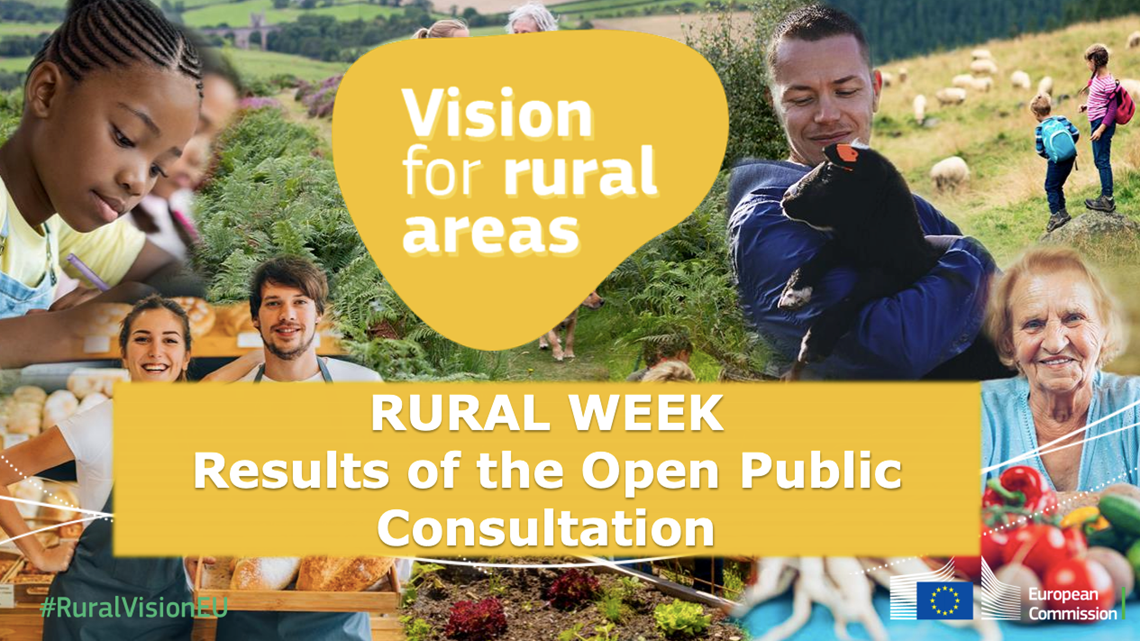Top politicians gathered to discuss the future rural development of the EU

The European Network for Rural Development, ERND, organized a digital conference on the 22-26 of March, together with the European Commission, to discuss EU's long-term vision for rural development. The conference consisted of various webinars and panel debates in which representatives from the European Commission, together with national and regional representatives participated.
How the EU's future rural development should look has been an issue on the European agenda for a long time, and in September 2020, the European Commission announced a public consultation on the EU's future vision for rural development. The networks Northern Sparsely Populated Areas (NSPA), which includes northern Sweden, Finland and Norway, and Europaforum Northern Sweden (EFNS), which includes Norrbotten, Västerbotten, Jämtland Härjedalen and Västernorrland, participated in the consultation through two position papers that established northern Sweden's view on the EU's long-term vision for rural development.
North Sweden summarizes the view of the NSPA and the EFNS and presents a summary of some of the interesting discussions that took place during the conference.
Northern Sweden's view of the EU's long-term vision for rural development
Northern Sparsely Populated Areas (NSPA), is a network that works to influence the regional policy of the EU and represents the 13 northernmost regions in Sweden, Finland, and Norway. On December 2, during the last steering group meeting of the year, NSPA adopted a position on the EU's long-term vision for rural development. In the position, the NSPA questioned, among other things, that the European Agricultural Fund for Rural Development, EAFRD, would not fall under the common acquis for the EU regional policy, and emphasized that it is of great importance that northern Europe participates in and influences the development of the rural development of the EU and that the EU needs to make better use of the potential that exists in northern Europe.
Europaforum Northern Sweden (EFNS), is a political network that works for northern Sweden's interests in the EU. The network includes Norrbotten, Västerbotten, Jämtland Härjedalen and Västernorrland. The EFNS did also respond to the consultation launched by the European Commission through a position paper in which they clarified, just like the NSPA, that the EU's vision for rural development, in a better way need to promote a more location-based policy better adapted to the needs of the regions. EFNS, thereto, expressed the importance of investing in digital and transport infrastructure, where, among other things, access to high-speed broadband is a prerequisite for the northern regions to be able to use digital services. Long distances and other aggravating territorial conditions mean that there is a risk that the commercial players refrain from investing in the expansion of broadband in northern Sweden. Therefore, broad collaboration and special investment support will be important to secure broadband access and thus be able to take advantage of the opportunities of digitalization.
Top politicians in a discussion about the EU's future rural development
The conference on the EU's future vision for rural development began with a panel debate, where top politicians gathered to discuss the EU's vision for rural development. There was a special focus on the challenges that exist in rural areas and how these challenges could best be handled. The Commissioner for Democracy, Dubravka Šuica, opened the conference by addressing the responses received by the European Commission from the September 2020 consultation. From the European Commission, it has been clear that they need to create a vision with the rural areas, not just for the rural areas. She also expressed that the European Commission's ambition is to create a context that offers new opportunities for the rural areas and that gives the people who live there a strong voice and a better influence in the policymaking.
The Commissioner for Agriculture, Janusz Wojciechowski, stated that over 80% of the EU is made of rural areas, which also supply the EU with vital raw materials. Despite this, there is a territorial inequality between the EU's cities and rural areas, which according to Wojciechowski is reflected in, among other things, the lack of infrastructure and insufficient healthcare, which also was clearly stated in the answers that came from the public consultation.
From the European Commission's Directorate-General for Agriculture and Rural Development, Mihail Dumitru spoke about the need for enhanced cooperation and a clearer political commitment to rural issues. He talked about the demographic challenges that exist in these areas. Therefore, it becomes incredibly important that there is active work from a political point of view to ensure that the rural areas have the same conditions as in urban areas. For these areas to be developed, we need to ensure that there is access to healthcare, schools, and an infrastructure that makes it possible to work in places other than where you live. We must work to unleash the potential of rural areas, Dumitru emphasized.
Read more about the conference for the EU's long-term vision for rural development here.
Read more about the EU's long-term vision for rural development here.
Read the position paper of NSPA here.
Read the position paper of EFNS (only in Swedish for now) here.
/ Matilda Albertsson
